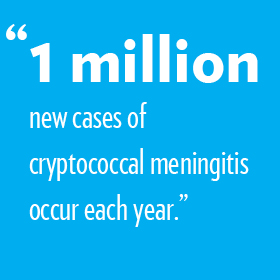Cryptococcosis is a fungal infection that kills more than 500,000 HIV/AIDS patients every year worldwide. Many patients die because their infection is not detected until disease has progressed to a brain infection. However, many of these deaths are preventable. Patients can be screened for early cryptococcal disease and treated before they develop life-threatening brain infection. New inexpensive blood tests and a readily available oral medication (fluconazole) make early detection (screening) and treatment more feasible.
Major international public health organizations like the Centers for Disease Control and Prevention (CDC) are working together with university scientists, non-governmental organizations, and governments in African and Asian countries to make screening and treatment for cryptococcal disease a reality in countries with high burdens of HIV/AIDS-associated cryptococcosis.
An infection with the fungus Cryptococcus is known as cryptococcosis, and it is a serious opportunistic infection among people with advanced HIV/AIDS. Cryptococcosis is not contagious, meaning it cannot spread from person-to-person. Cryptococcal meningitis specifically occurs after Cryptococcus has spread from the lungs to the brain.
Worldwide, approximately 1 million new cases of cryptococcal meningitis occur each year. Most of these cases are opportunistic infections that occur among people with HIV/AIDS. Although the widespread availability of antiretroviral therapy (ART) in developed countries has helped reduce cryptococcal infections in these areas, it is still a major problem in developing countries where access to healthcare is limited. Throughout much of sub-Saharan Africa, for example, Cryptococcus is now the most common cause of meningitis. Cryptococcal meningitis is one of the leading causes of death in HIV/AIDS patients; in sub-Saharan Africa, it may kill more people each year than tuberculosis.
Cryptococcal antigen is a substance produced by the fungus Cryptococcus. Antigen tests can also be used to diagnose cryptococcal infection, and antigen can be detected in the body even before a patient has any symptoms of the infection. Tests that detect cryptococcal antigen (latex agglutination and enzyme immunoassay) are both sensitive and accurate, but are not always available in many parts of the world.
A new antigen detection test, called the Lateral Flow Assay (LFA), is a rapid dipstick test. This test is:
- Simple and quick: The results of the LFA are available in 10 minutes, and the test can be performed without the use of complicated laboratory equipment. Cryptococcal antigen is detectable in cerebrospinal fluid (the fluid surrounding the brain and spinal cord) and serum (a component of blood) even before meningitis symptoms develop.
- Effective: The test is sensitive, accurate (>95%), and highly predictive of who is at risk for developing cryptococcal meningitis.
- Affordable: At a cost of approximately $2 per test, the LFA is cheaper than the other methods used to diagnose cryptococcosis.
There are several antifungal medications that can treat cryptococcal infection. Amphotericin B is an intravenous medication that is given only in hospitals because it requires close monitoring for side effects. Flucytosine and fluconazole are oral medications that a patient can take at home. Fluconazole is available in some areas of the world free of cost to governments through the Diflucan Partnership Program (Pfizer).
More information on the treatment of cryptococcal infection, including treatment for cryptococcal antigenemia as well as meningitis, can be found in the following documents:
- World Health Organization guidelines for the Diagnosis, Prevention, and Management of Cryptococcal Disease in HIV-Infected Adults, Adolescents, and Children
- South African Guidelines for the Prevention, Diagnosis, and Management of Cryptococcal Meningitis and Disseminated Cryptococcosis in HIV-infected patients
- Infectious Diseases Society of America Clinical Practice Guidelines for the Management of Cryptococcal Disease



